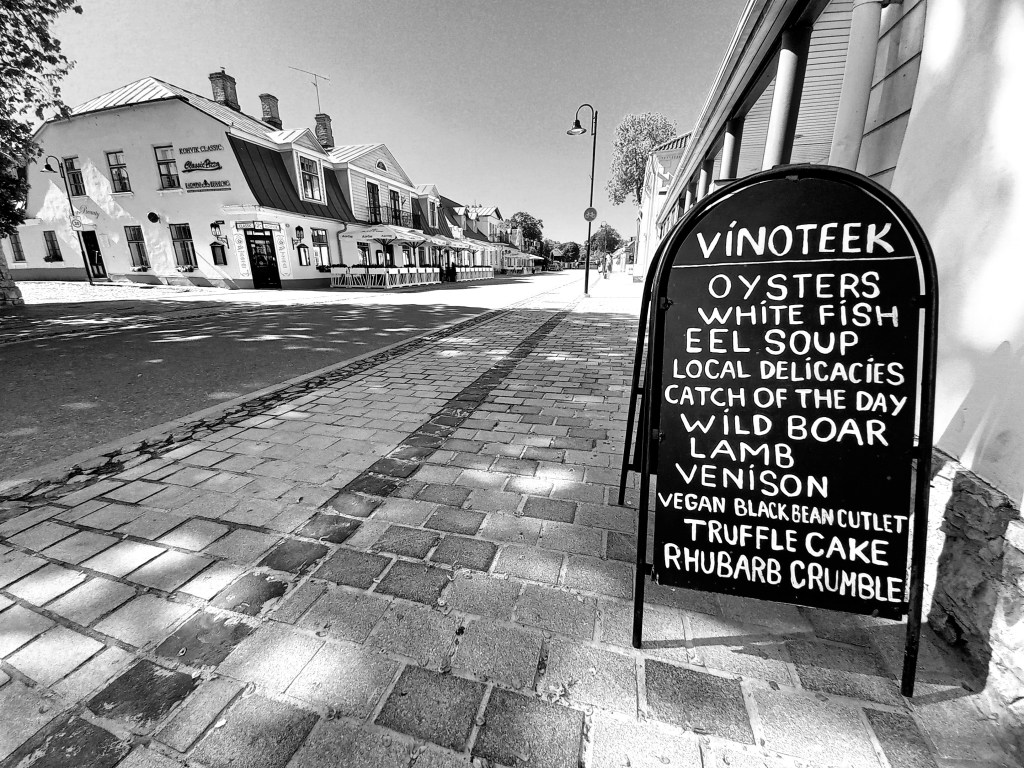ONE DAY BEFORE my artist friend went away, he told me in a somewhat excited voice that he had just seen the most beautiful woman working at a local bakery. Actually, he did not describe her as being beautiful. He said that she was hot. “You have to go see her,” he said. I told him I would. “Let me know what you think.” There were actually three women working in this bakery. Two of them were slender and dark haired, but the third woman, the one behind the counter in an apron, was voluptuous and blonde. She was of indeterminate age, but surely my age or older. It’s not always easy to tell. Something seemed rather soft and giving about her, and she must have wondered why this strange yet familiar man was peeking around and not buying any pirukad. Our eyes met, I waved, and was out the door.
Later, my friend asked me, “So, did you see her?” “Ah, yes, the blonde baker? She was pretty.” “What?” he said. “I barely noticed there was a blonde baker! I was talking about the slim one, with the dark hair.” “Oh,” I said. “I think there were two women with dark hair there.” “You think? How could you not even notice her?” “How could you not notice my sexy blonde baker?” “Right, I forgot about you,” he said. “You like fat girls.” “Not fat. Voluptuous,” I said. “Fertile.” The conversation ended there, in a morass of superficiality. Yet it revealed something interesting. How could two men walk into the same bakery and see things in such different ways?
I still walk by this bakery to check in on the blonde baker. Something about her fascinates me. She is there in the back, baking, working. She has a bit of a sad or melancholic look in her eyes, but I don’t think that is so unusual for Estonia. I remember years and years ago, when we lived in Tallinn, there was a young Estonian Russian woman who worked at the Central Market who looked very much the same, with the same round figure and blonde hair and sad, melancholic eyes, but was more dynamic, as Russians are known to be. She was enthusiastic when she was requested to hand over kilos of buckwheat or slice up some cheese for a client with her big knife. I wondered about her life then, where she lived, what she read, if she read books at all. If she listened to music in her room at night, what kind of music, maybe that pop duo t.A.T.u?
Just like I wonder about the Viljandi baker and what her life is like. Maybe she ends each night nibbling on the day’s leftovers and watching Eesti Televisioon? Or maybe she has fallen in with the hip crowd and would like to invite me to one of those tantra courses, where everybody is blindfolded and gets to touch each other, or even some ayahuasca retreat, so we can all hallucinate and vomit together? Perhaps she speaks to angels? I’ll never know. These people of the service economy belong to a tribe of their own. They fascinate me but we remain a world apart. The lofty and pretentious goals of creatives are probably nice to hear about, but would they ever choose a man like me? I doubt it. Usually, when I do see their partners arrive, for a quick interlude on a lunch break, they are local dudes who drive jeeps or motorcycles. Their plan is probably to make enough money for a house, or buy an old farm on the edge of town and fix it up and raise kids. Simple pleasures. They’re not so different from the people I grew up around in New York. They work for vacation, for the dream of tomorrow, or just to have some food on the table. Seldom in this life would they pause to admire the beauty of a baker, a florist, or a cashier.
But I have.
Sometimes I do dream about a life with such a person. Maybe it would be wonderful. Maybe it would balance me out. Wouldn’t it be good to come home and sit beside a baker, or a hairdresser and not worry about how their project is going, and if they have some creative block? It’s easy to get lost in such visions and illusions, and easier to write about them. In fact, that is in part what we writers are. Masters of illusions. Sometimes we are so good, we even fool ourselves. Yet these fantasies do reach their natural ends. The baker’s boyfriend arrives on his motorcycle, wearing a leather jacket and gold chain, smelling of cologne. She closes shop, gets on his bike and wraps her arms around his torso. Her golden hair dances in the wind. Then he starts it up and away they go.
Off and into the sunset.

